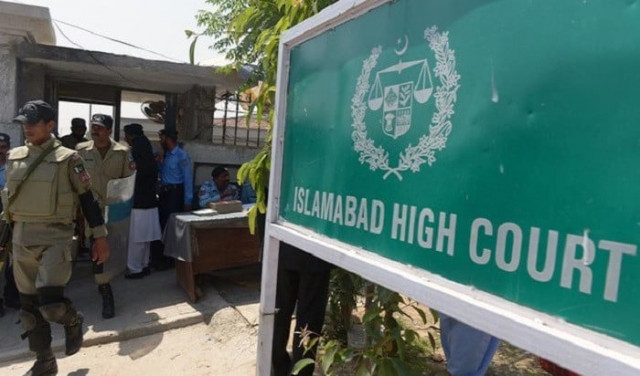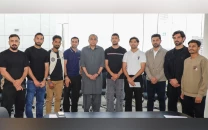IHC snubs plea to cancel Imran’s arrest warrants
Observes sessions court’s decision in accordance with law

The Islamabad High Court on Wednesday termed the issuance of the arrest warrants for PTI chairman Imran Khan by a sessions court in the Toshakhana (gift depository) case in accordance with the law and rejected a plea moved by the party to cancel them.
The court observed that the petitioner, Imran, and others should follow the order.
Before the IHC verdict, the Zaman Park residence of the deposed prime minister turned into a battleground between police personnel, who wanted to arrest Imran as per the trial court’s order and tenacious party activists, who wanted to prevent that at any cost.
This situation compelled the Lahore High Court to intervene and order the police to put off their operation till 10am on Thursday until the IHC verdict was announced.
At the IHC, its Chief Justice Aamer Farooq announced the judgment after reserving it earlier in the day.
In the verdict, he directed Imran to submit his undertaking to the sessions court.
In that undertaking, Imran had pledged to appear before the trial court on March 18.
Upholding the sessions court order in the case, the IHC noted that it should decide on Imran’s undertaking in accordance with the law.
Read Imran asks supporters to 'carry on struggle' even if killed or arrested
On Monday, a district and sessions court in Islamabad issued non-bailable arrest warrants for Imran after his continuous absences in the Toshakhana case.
Additional District and Sessions Judge Zafar Iqbal also directed the police to arrest the deposed premier and present him before the court on March 18.
The IHC verdict read that as the non-bailable warrants of arrest had been issued by the trial court for the purposes of procuring the attendance of the petitioner, Imran had undertaken to appear before it.
“The competent court is the learned trial court, it is to satisfy itself regarding the undertaking and pass [an] appropriate order as to the status of the warrants,” it added.
The IHC noted that the law and order situation in Lahore was a “sad state of affairs” where the State was being prevented from carrying out its obligation for complying with the orders of the court.
“Such defiance of the law is not acceptable in any civilised society and the law needs to be adhered to by the citizens/people of any country in general and persons in the helm of the affairs particularly. The phrase ‘rule of law’ is not a rhetoric and has different connotations, including obedience to law and any defiance thereof naturally has consequences because law of the land has to and should prevail at all costs,” the judgment stated.
Also read PTI claims Imran's residence under 'extreme attack' as skirmishes intensify
The IHC observed that the lower court’s order did not suffer from any legality. It further noted that the matter should be placed before the trial court, which issued and reissued the non-bailable arrest warrants.
At the start of the hearing at the IHC, Justice Farooq asked PTI lawyer Khawaja Haris if he had settled all the objections that the court had earlier raised on the petition.
He added that the plea would only be taken up for hearing once it had been scheduled.
In response, Haris urged the IHC to hear the petition on Wednesday.
The IHC CJ remarked that the court had taken up the petition earlier as well. He pointed out that the IHC had also issued directions, asking what had “unfortunately” happened after that.
Haris insisted that the IHC should hear the PTI’s petition, imploring the court that he would legally convince the bench on the matter.
Justice Farooq inquired that the IHC had previously granted relief to his client but what happened to its orders.
The judge remarked that the court would review the possible repercussions of not implementing its orders.
Haris replied that the “entire situation” was visible to the judge.
The IHC CJ held the PTI responsible for the mess. He added that the IHC had provided a “respectable” path that was not followed.
The court later directed the PTI lawyer to remove objections from the petition so that the application could be taken up.
As the hearing resumed at 2pm, Haris began presenting his arguments on the petition.
He said Imran had challenged the court orders of March 13.
The lawyer added that his client had been asked to appear before the court on March 13, but he was at home and that was why the PTI’s legal team was filing an exemption plea.
He argued that the issuance of arrest warrants made no sense as there was a difference between criminal cases and bail requests.
Haris added that the PTI's legal team had urged the trial court not to issue warrants until the maintainability of the petition was decided.
The lawyer also challenged the nature of the complaint. He contended that the complainant was not authorised to file such a plea
Haris argued that the Election Commission of Pakistan (ECP) was not authorised to send a criminal case to a trial court.
However, Justice Farooq observed that appearing in court was mandatory regardless of the case for which a suspect was summoned.
The lawyer presented an affidavit signed by Imran and requested the IHC CH to suspend the arrest warrants issued for his client.
The lawyer expressed his regret over the prevailing situation in Lahore and hoped that it would be resolved quickly.
The IHC CJ again expressed his commitment to upholding the integrity of the court, observing that respect for the judiciary was of paramount significance to him.
Justice Farooq noted that whether it was a civil or a trial court, a citizen must respect the court.
He added that judicial orders were issued with a signature as the courts did not have the means to show its power.
The IHC CJ asked Additional Advocate General (AAG) Munawar Iqbal where the government would keep Imran if he was taken into custody four days before the scheduled date for his court appearance.
Iqbal told the judge that similar affidavits had been issued earlier, but the person who handed them over had not appeared before the court.
The AAG also asked why the PTI chief had remained absent from his court appearances despite being a national leader.
Earlier at the LHC, Justice Tariq Saleem Sheikh restrained the police from continuing the Zaman Park operation until 10am on Thursday so that the IHC could decide on the non-bailable arrest warrants of Imran.
Justice Sheikh was hearing different petitions including pleas seeking a safe way for Imran to reach the LHC to acquire protective bails in different FIRs and to stop the alleged atrocities of the police being inflicted on the PTI chief, his political party, its leadership as well as the general public.
As the proceedings commenced, petitioners Imran and PTI leader Fawad Chaudhry’s lawyer Azhar Siddique contended that the whole city had been sealed for the sole purpose of executing arrest warrants.
“When we talk with the authorities about elections, they respond to us by saying they did not have enough personnel to deploy for this purpose,” he argued.
He added that the procedures were available over how to execute arrest warrants and when proceedings to declare a relevant person a proclaimed offender was to be started.
In the first phase of the proceedings, Justice Sheikh summoned the law officers representing federal and provincial governments.
Justice Sheikh also summoned the deputy attorney general and Advocate General Punjab Shan Gul by 2pm.
As the proceedings commenced again, all relevant law officers were present in the courtroom.
This time, PTI’s another lawyer Khawaja Tariq Rahim told the court that tear gas shelling outside Imran’s Zaman Park residence was an unconstitutional act.
He added that what was happening at Zaman Park was in sheer violation of the fundamental rights of citizens.
He further argued that despite the passage of several hours, the police were hell-bent on “illegally” arresting Imran. To this, Advocate General Gul argued that the matter was still pending at the IHC so the present petition was not maintainable at the LHC.
“Who has arrived from the Islamabad police to Lahore [to arrest Imran]?” Justice Sheikh asked.
“We have checked it,” the lawyer representing the federal government responded.
“The Islamabad police do not fall under the LHC,” he further argued.
On a point, Justice Sheikh remarked the LHC would issue arrest warrants in case no one from Islamabad police came to this court.
However, this time the court summoned the Punjab chief secretary, provincial police chief, and Lahore capital city police officer at 3pm to listen to their views over the matter.
These officers as well as the Islamabad police officials appeared before the court.
As the proceedings resumed again, Justice Sheikh asked the IGP about the issue at Zaman Park.
Punjab IGP Dr Usman Anwar told the court that he was in an ECP meeting when the Islamabad police sought contingents to execute the non-bail-able arrest warrants of Imran. Shedding light over the current status at Zaman Park, the IGP told the court that 59 police officials had suffered injuries.
He added that there was a consensus among police officials that no one would use weapons to prevent the recurrence of a Model Town-like incident.
“We just tried to overpower the situation through a water cannon and tear gas shelling,” he told the court.
However, the PTI activists used petrol bombs on the police, he added.
“Police vans were set ablaze. Women police personnel were harassed,” the Punjab IGP maintained.
He added that Rangers were called to the scene to assist the police but the activists attacked them as well.
The IGP made it clear that there was no operation against Imran, adding that the police only wanted to execute the arrest warrants.
“If the court takes back its order, we will stop its execution,” the Punjab police chief continued.
The chief secretary backed the IGP’s stance. To this, Justice Sheikh remarked that he had passed an order stopping operation at Zaman Park until the IHC reached a decision as he wanted peace in Lahore.
The IGP told the court that police personnel from other districts had been summoned to bring the situation under control.
Justice Sheikh observed that police officials were present on Mall Road, Canal Road, and Dharampura and he had simply passed the orders to stop the clashes between the two sides until the IHC decision.
The judge, after stopping the Zaman Park operation till the decision of IHC, adjourned the hearing of the case till Thursday at 10am.



1733130350-0/Untitled-design-(76)1733130350-0-208x130.webp)















COMMENTS
Comments are moderated and generally will be posted if they are on-topic and not abusive.
For more information, please see our Comments FAQ